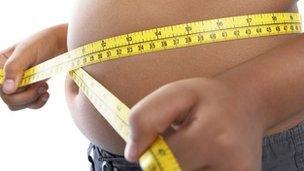Healthy lifestyles: Is a hug, shove, nudge or smack best?
- Published
- comments

Obesity rates have been rising
With all the controversy over the government's NHS reforms, it is easy to forget the system is changing in terms of tackling unhealthy lifestyles too.
From 1 April, alongside the creation of a whole new structure in the health service, local government will be given responsibility for public health.
That means from encouraging people to give up smoking to drinking and eating less, it will be the job of councils to help us alter our unhealthy habits.
The move marks a return of public health to the local government fold - nearly 40 years after it was taken away.
In the meantime, the nation has got more obese and alcohol consumption has soared.
So what should councils do?
Ben Page, chief executive of the polling group Ipsos Mori, has perhaps put it most succinctly.
He says because of local government's power over everything from schools and planning to leisure services and green spaces it has a "great opportunity" to influence behaviour.
But councils have a choice over how they can go about this, he says. They can either hug, smack, nudge or shove.
Free leisure
But what exactly does he mean?
A look at what is happening already provides some clues.
While the NHS has been formally responsible for public health since 1974, the past decade has seen councils working increasingly closely with their NHS cousins.
It has resulted in some pretty interesting schemes.
Several areas have used financial incentives to get people to give up smoking - particularly among pregnant women and new mothers.
In exchange for quitting, they have received vouchers which they can then use to pay for nappies or other baby products.
That, of course, constitutes a hug.
Meanwhile, nudging, for which the government itself has been a strong advocate, involves more subtle approaches.
In some areas, councils have started providing free entry to leisure services at certain times.
But sometimes it involves smaller steps. For example, trading standards officers have been working with fish and chip shops in north-east England to get them to use salt shakers with fewer holes.
Reducing them from 17 to five can cut salt consumption by three quarters.
At the other end of the spectrum are the more draconian shoves or smacks.
These can involve closing down takeaways near schools (a shove) or a ban on smoking near playgrounds (a smack).
Dr Janet Atherton, president of the Association of Directors of Public Health, says "there's probably a place for all four".
To help kick-start the process, the government has provided councils with a ring-fenced budget of nearly £3bn to spend on public health initiatives.
This has caused some grumbling within local government, which is seeing the rest of its budget slashed, while others argue it is not enough to make a difference.
But many are still hopeful.
Research has shown that at any one time the NHS is only directly affecting the lives of one in five people.
But Blackburn's public health director, Dominic Harrison, says public health is different as it has a "much bigger impact".
He even says councils should challenge themselves to create a new perception of themselves.
He points out that what is done in the next few years could become as important in the public consciousness as hospitals - which, he says, symbolise our "willingness to care for each other".
If that happens, perhaps there will be marches to save a local council rather than the A&E department in the future.